The Definitive Expat Guide to Dubai
Why would an expat choose to live in Dubai?
Dubai offers a high standard of living with modern infrastructure, excellent healthcare facilities, and a thriving business environment. The city has a diverse and multicultural population, which makes it easy for expats to integrate and make friends. Dubai’s location in the Middle East makes it an ideal gateway for exploring the region’s rich history, culture, and natural beauty.
Six Fast Facts on Dubai
- World’s Tallest Building: Dubai is home to the Burj Khalifa, the tallest building in the world, standing at a staggering 828 meters (2,717 feet). This architectural marvel features 163 floors, including a viewing deck on the 148th floor, offering breathtaking panoramic views of the city.
2. Man-made Islands: Dubai boasts several man-made islands, including the famous Palm Jumeirah and The World Islands. Palm Jumeirah, shaped like a palm tree, houses luxury villas, hotels, and resorts, while The World Islands is an ambitious project consisting of 300 small islands designed to resemble a map of the world.
3. Multicultural Society: Over 200 nationalities call Dubai home, making it one of the most culturally diverse cities globally. This rich diversity is reflected in its cuisine, festivals, and shopping experiences, where you can find products and delicacies from all around the world.
4. Gold Souk: Dubai is often referred to as the “City of Gold” due to its famous Gold Souk in Deira. This traditional market features hundreds of shops selling gold, diamonds, and precious gems, attracting tourists and residents alike.
5. Indoor Ski Resort: Dubai is home to Ski Dubai, the first indoor ski resort in the Middle East. Located within the Mall of the Emirates, Ski Dubai features an 85-meter high indoor mountain with five slopes, including a 400-meter long run, allowing visitors to enjoy skiing, snowboarding, and tobogganing in the heart of the desert city.
6. Green Initiatives: Despite being a desert city, Dubai is committed to environmental sustainability. The city aims to generate 75% of its energy from renewable sources by 2050, and the Dubai Clean Energy Strategy 2050 focuses on increasing clean energy use and reducing energy consumption. Dubai also features the world’s largest single-site solar park, the Mohammed bin Rashid Al Maktoum Solar Park, which is expected to produce 5,000 megawatts of electricity by 2030.
Contents
Contents
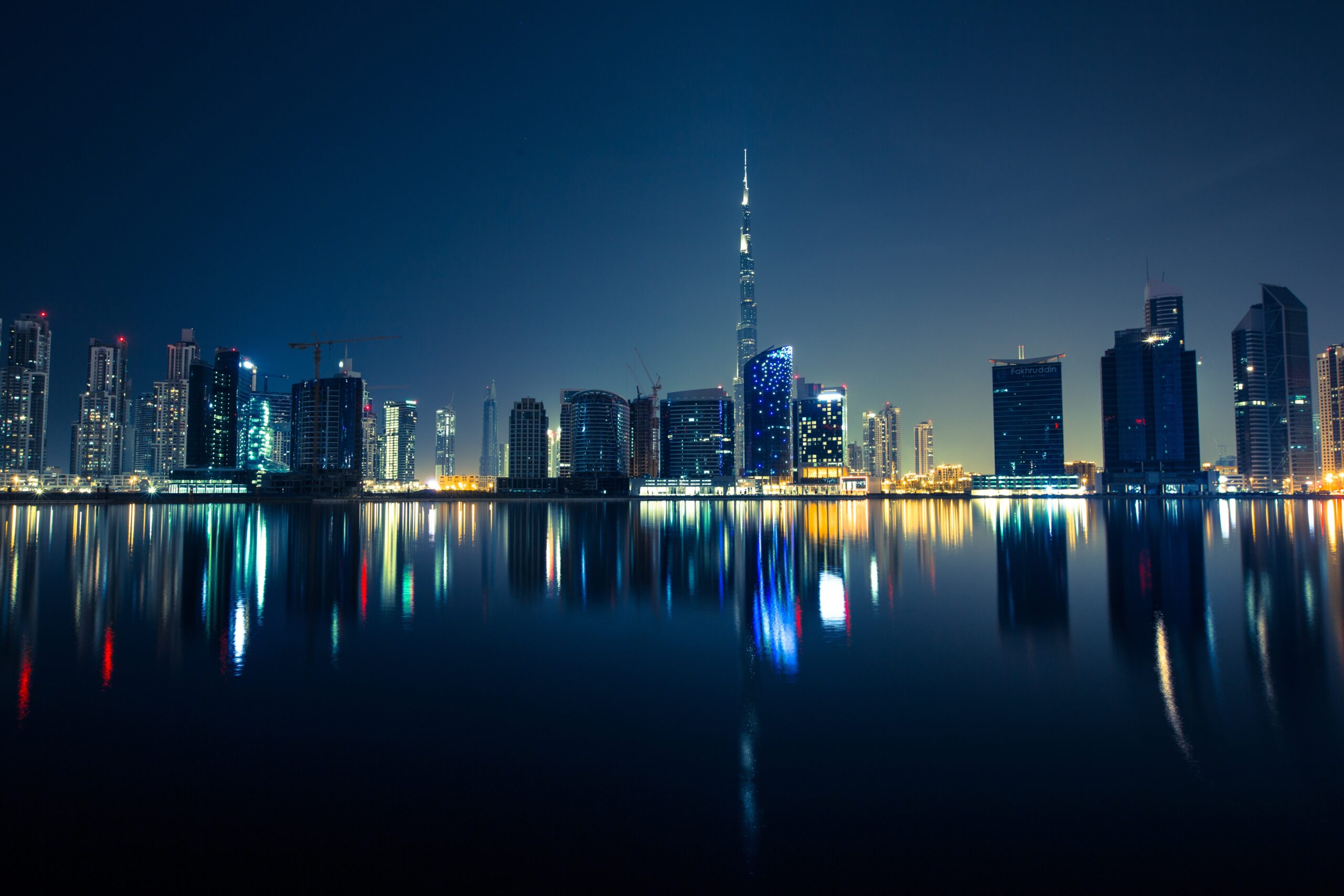
Housing & Accomodation
Dubai, a dazzling gem in the United Arab Emirates, is renowned for its luxurious lifestyle, futuristic architecture, and thriving property market. The city’s diverse range of housing and accommodation options cater to the needs of its multicultural population, including expats, tourists, and Emirati nationals.
One of the key features that sets Dubai’s property market apart is the plethora of high-end apartments and lavish villas. These properties, often located in prime areas such as Palm Jumeirah, Downtown Dubai, and Dubai Marina, offer breathtaking views, state-of-the-art facilities, and unrivalled security. Additionally, purpose-built communities like Arabian Ranches, Damac Hills, and Jumeirah Golf Estates cater to families seeking a serene environment, complete with lush landscapes, schools, and shopping centres.
For those on a budget, Dubai offers affordable housing options in areas like Al Qusais, International City, and Al Nahda. These neighbourhoods provide a mix of apartments and townhouses at competitive prices, with easy access to public transport and essential amenities.
While searching for accommodation in Dubai, it’s crucial to be aware of certain lesser-known tips:
- Utilise online property portals: Websites like Bayut, Property Finder, and Dubizzle can be valuable resources for finding listings tailored to your preferences. These platforms offer detailed information on properties, neighbourhoods, and prices, allowing you to make an informed decision.
- Know the rental contract: Familiarise yourself with Dubai’s rental regulations, which include a cap on rental increases and guidelines for contract termination. The Dubai Land Department’s Rental Dispute Centre can provide assistance if any disagreements arise.
- Negotiate: Although rental prices in Dubai are generally fixed, there’s always room for negotiation. Don’t hesitate to discuss terms with the landlord, as you may be able to secure a better deal, especially if you offer a higher number of cheque payments.
- Understand the chiller charges: In Dubai, air conditioning is essential due to the hot climate. Some buildings include chiller charges in the rent, while others require separate payments. It’s important to clarify this before signing the contract to avoid unexpected expenses.
- Check for maintenance: Prior to moving in, inspect the property thoroughly for any maintenance issues. The landlord is responsible for major repairs, so ensure they are addressed before signing the contract.
Work & Business
Dubai, an awe-inspiring global business hub, has consistently transformed itself into a thriving metropolis that caters to diverse industries and international companies. A focal point of commerce in the Middle East, the emirate is renowned for its ease of doing business, tax-free environment, and state-of-the-art infrastructure.
Over the years, Dubai has actively diversified its economy, reducing its reliance on oil and focusing on sectors like tourism, finance, and technology. The emirate is home to numerous free zones, such as the Jebel Ali Free Zone and the Dubai International Financial Centre, which offer businesses a range of attractive incentives, including 100% foreign ownership and customs tax exemptions.
While it is common knowledge that Dubai is a business-friendly city, there are lesser-known tips that can be advantageous for entrepreneurs and professionals alike. One such tip is the concept of “Wasta,” an Arabic term referring to connections and influence. In Dubai, establishing strong relationships and networks can significantly improve business prospects, as personal connections often play a significant role in securing deals or obtaining approvals.
Another lesser-known tip is to familiarize oneself with the local business culture and etiquette. Understanding the importance of hierarchy, respect for elders, and showing courtesy during meetings can go a long way in establishing rapport with Emirati counterparts. For instance, serving Arabic coffee or tea at meetings is a sign of hospitality and should not be refused.
Additionally, learning basic Arabic phrases can be beneficial in building connections and demonstrating respect for the local culture. While English is widely spoken in Dubai, showing an effort to engage in the local language can leave a positive impression.
Dubai’s strategic location, at the crossroads of Europe, Asia, and Africa, makes it an ideal gateway to access emerging markets. To make the most of this opportunity, businesses should explore partnerships with local companies, as these collaborations can provide valuable insights and facilitate smoother market entry.
Cost of Living
The cost of living in Dubai varies significantly depending on one’s lifestyle choices and personal preferences. Known for its luxury and extravagance, Dubai also offers budget-friendly options for those who wish to maintain a more modest lifestyle. The following breakdown covers various aspects of daily life, providing insights into the expenses one might encounter in this dynamic city.
Accommodation in Dubai can range from affordable apartments to lavish villas. For a single-bedroom apartment in a decent area, one can expect to pay between AED 30,000 and AED 60,000 per year. For a larger family, a three-bedroom apartment could cost between AED 80,000 and AED 150,000 per year. Additionally, utilities for a typical two-bedroom apartment are likely to cost around AED 600 to AED 1,000 per month.
Food expenses in Dubai can vary greatly depending on whether one opts to dine out or cook at home. Groceries for a single person might cost around AED 1,500 per month, with prices potentially doubling for a family of four. Dining out can be quite costly, with a meal at an average restaurant costing approximately AED 50 to AED 75 per person. However, lesser-known food courts and cafeterias in residential areas offer affordable meals for as low as AED 10 to AED 15 per dish.
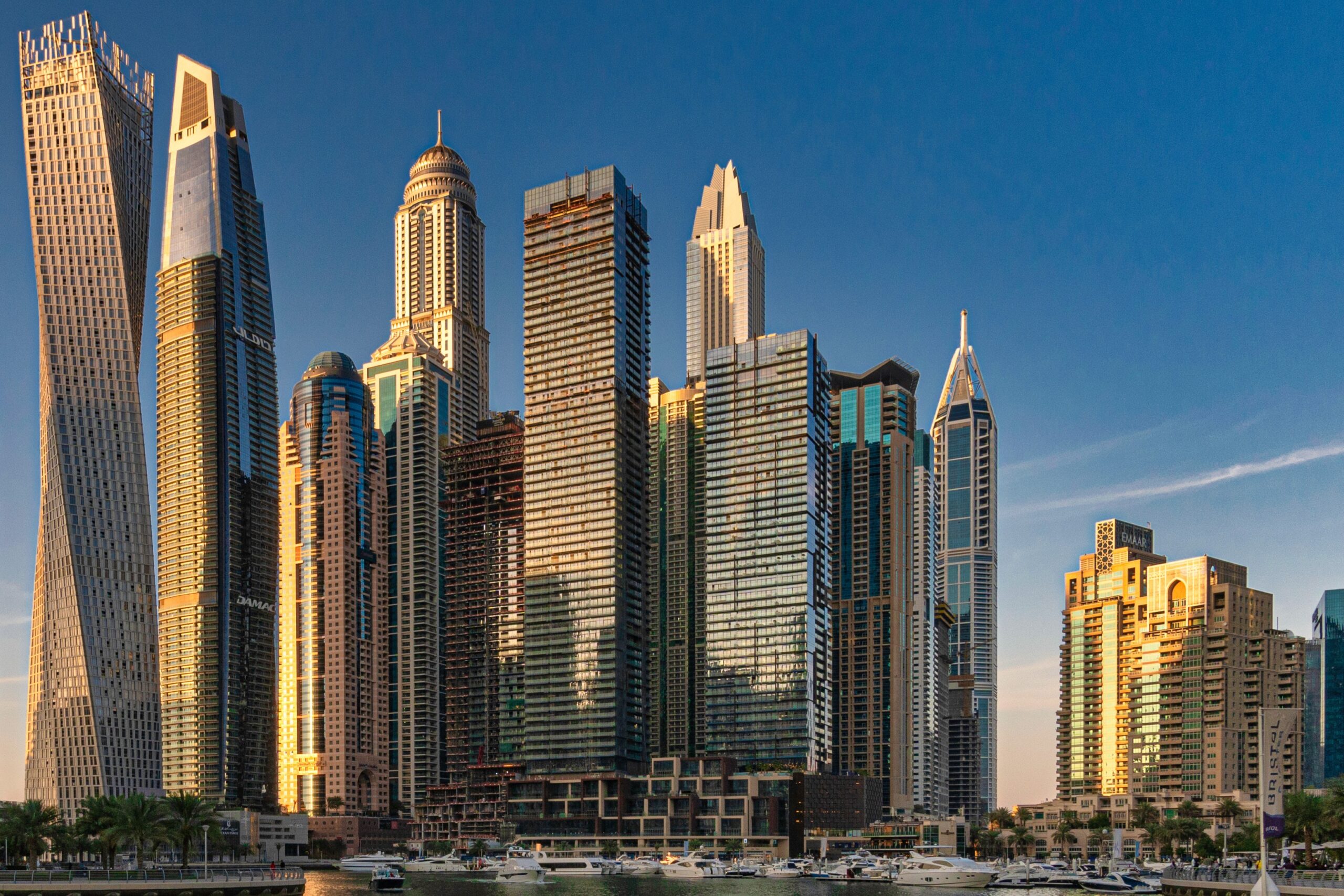
Public transportation is a cost-effective option for getting around Dubai. A monthly pass for the metro, tram, and buses costs about AED 350. Taxis are also available but can be more expensive, with a 10-kilometre trip costing around AED 25 to AED 35.
Lesser-known costs in Dubai include annual vehicle registration fees (around AED 350 to AED 500), parking permits for residential areas (AED 1,200 to AED 2,500 per year), and gym memberships (AED 150 to AED 300 per month). In addition, expats who enrol their children in private schools can expect tuition fees ranging from AED 20,000 to AED 120,000 per year, depending on the institution.
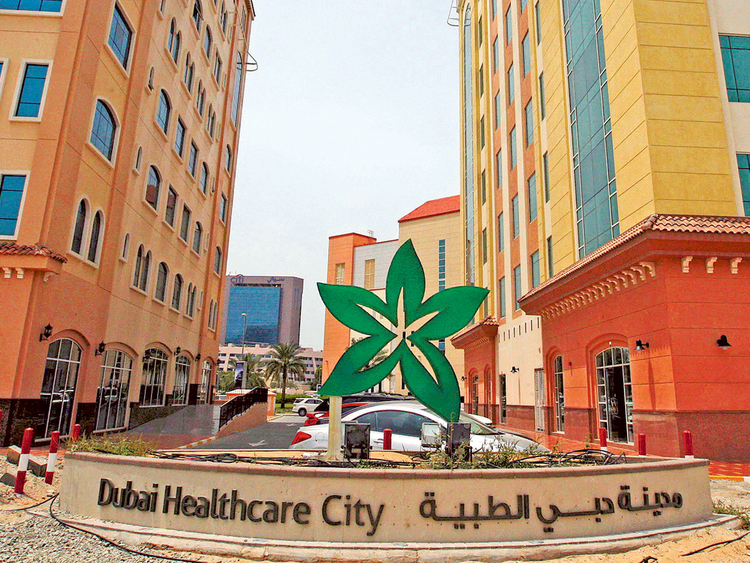
Healthcare
Dubai’s healthcare system is renowned for its high-quality medical services, state-of-the-art facilities, and skilled professionals from around the globe. The Dubai Health Authority (DHA) governs and regulates healthcare in the emirate, ensuring that the services provided meet international standards. In 2021, Dubai was ranked 6th among the world’s best cities for healthcare by CEOWORLD Magazine, a testament to its commitment to excellence in this sector.
The healthcare system in Dubai is a mix of public and private providers, catering to a diverse population. The DHA operates four hospitals, while numerous private facilities offer a wide range of medical services. With a doctor-to-population ratio of 2.5 per 1,000 people in 2020, Dubai’s healthcare system is well-equipped to address the needs of its residents and visitors.
A key factor contributing to Dubai’s healthcare success is its investment in cutting-edge medical technology. The emirate is a hub for medical tourism, attracting patients from around the world seeking specialised treatments and procedures. Dubai has set an ambitious target of attracting 500,000 medical tourists annually, showcasing its dedication to becoming a global healthcare leader.
Dubai’s healthcare system prioritises preventive care, with the DHA implementing various screening and vaccination programmes. The emirate has been particularly effective in managing the COVID-19 pandemic, thanks to its robust healthcare infrastructure and proactive measures. By September 2021, more than 87% of the eligible population in Dubai had received at least one dose of the COVID-19 vaccine.
The DHA also promotes digital health solutions to improve patient care and healthcare administration. The authority has developed a unified electronic medical record system called “Salama,” which enables easy access to patient information across all DHA facilities. This not only streamlines the healthcare process but also enhances patient safety and quality of care.
To maintain a high standard of healthcare professionals, Dubai mandates strict licensing requirements for medical practitioners. Additionally, the emirate invests in medical education, with institutions like the Mohammed Bin Rashid University of Medicine and Health Sciences offering world-class training and research opportunities.
Education
The education system in Dubai is a diverse and thriving ecosystem that accommodates a multitude of nationalities, cultures, and curricula. With over 200 private schools and 17 public schools, Dubai’s educational landscape offers a wide range of options for students and parents alike. Most recent data was that over 300,000 students were enrolled in the emirate’s private schools, representing more than 187 different nationalities.
The Knowledge and Human Development Authority (KHDA) is the regulatory body responsible for monitoring and ensuring the quality of education in Dubai. The KHDA conducts annual inspections of private schools, rating them on a scale from ‘Outstanding’ to ‘Very Weak’. In the most recent data available, 17 schools were rated ‘Outstanding’, while 38 schools achieved a ‘Very Good’ rating. These inspections play a vital role in driving improvements in the quality of education across the city.
Dubai’s education system offers various curricula, including the British, American, Indian, International Baccalaureate (IB), and the United Arab Emirates’ national curriculum. The British curriculum is the most popular, with approximately 78 schools offering it, followed by the Indian curriculum with 34 schools. The choice of curriculum allows families to select an education that aligns with their cultural background, preferences, and future aspirations.
The government of Dubai is committed to fostering innovation and promoting excellence in education. In 2017, the Dubai Future Foundation launched the ‘Dubai 10X’ initiative, which aims to place Dubai’s government entities ten years ahead of the rest of the world. As part of this initiative, the KHDA introduced the Rahhal programme, an innovative learning framework designed to accommodate diverse learning needs and preferences, allowing students to create a personalised learning journey.
In addition to traditional schools, Dubai also offers various higher education institutions, such as universities and vocational training centres. Dubai International Academic City (DIAC) hosts over 25 international universities, providing students with the opportunity to pursue world-class tertiary education in fields like business, engineering, and technology.
Visa and Immigration
Visas and immigration in Dubai are crucial aspects to consider for individuals planning to visit, work, or reside in this dynamic city. Dubai, being part of the United Arab Emirates (UAE), adheres to federal immigration laws and regulations. The visa requirements vary depending on the purpose of your visit, your nationality, and the duration of your stay.
Tourist visas are available for visitors from various countries, with visa-free entry granted to citizens of the Gulf Cooperation Council (GCC) countries. For other nationalities, the visa application process is generally straightforward. Tourist visas can be acquired through UAE-based airlines, hotels, or travel agencies, and are usually valid for 30 days, with an option to extend for an additional 30 days.
Employment visas are necessary for individuals seeking work in Dubai. To obtain an employment visa, one must secure a job offer from a UAE-based company. The employer then acts as a sponsor and initiates the visa application process. Work permits are typically valid for two years and can be renewed. It is essential to note that working in Dubai without a valid employment visa is illegal and can result in fines or deportation.
For entrepreneurs and investors, the UAE government offers long-term residency visas, lasting up to 10 years. These are granted to individuals who meet specific investment or business criteria, enabling them to establish or expand their ventures in Dubai.
Family members of residents in Dubai can also apply for residency visas under certain conditions. For instance, a husband can sponsor his wife and children, provided he meets the minimum salary requirement and has valid employment in the country. Similarly, a wife can sponsor her husband and children if she is employed in a specific profession and meets the salary threshold.
Students planning to study in Dubai must obtain a student visa, which is typically valid for the duration of their course. Educational institutions in Dubai sponsor these visas, and students must maintain their enrolment status to remain eligible.
It is crucial to ensure that your passport is valid for at least six months beyond your intended stay in Dubai. Visa and immigration rules may change, so it is always advisable to consult the UAE embassy or consulate in your home country for the most up-to-date information before making any travel plans. By staying informed and following the proper procedures, you can ensure a smooth and hassle-free immigration experience in Dubai.
Transportation
Transportation in Dubai is as diverse and exciting as the city itself, offering a myriad of options to whisk you away to your desired destination. Whether you fancy taking the skies or the streets, this metropolis has a transport mode to suit your style.
The Dubai Metro, a shining example of modern engineering and urban connectivity, provides a swift and efficient way to traverse the city. With its immaculate carriages and punctual service, the Metro takes pride in offering a seamless journey for both residents and visitors alike. For those who enjoy a touch of luxury, the Gold Class cabins offer plush seating and added privacy, ensuring your ride is nothing short of exceptional.
If you’re keen to explore Dubai’s azure waters, hop aboard an abra, a traditional wooden boat, for a leisurely cruise along the scenic Dubai Creek. This centuries-old mode of transport effortlessly blends the charm of the past with the excitement of the present, allowing you to revel in the city’s rich heritage.
For an eco-friendly option, look no further than the Dubai Tram. This modern marvel glides effortlessly through the bustling streets, providing a clean, energy-efficient means of getting around. Its sleek design and state-of-the-art technology make it a popular choice for those keen to reduce their carbon footprint.
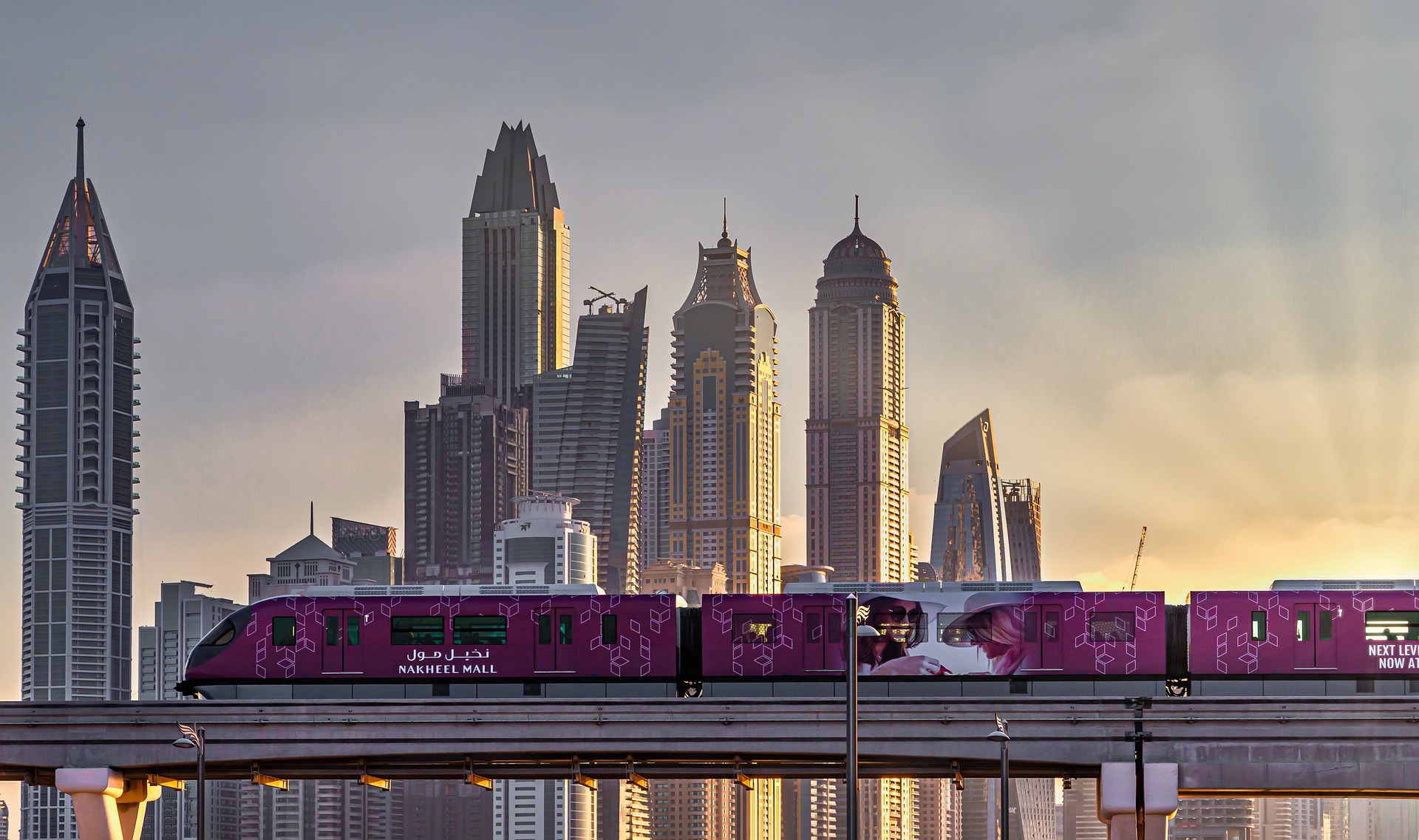
Of course, Dubai wouldn’t be complete without its world-famous taxis. These vibrant vehicles, painted in hues of cream and pink, are ready to zip you around the city at a moment’s notice. With a fleet of friendly drivers, you’ll feel right at home as you navigate the city’s iconic landmarks.
For the thrill-seekers, Dubai’s helicopter and seaplane tours offer a birds-eye view of the stunning skyline. Soaring high above the city, you’ll marvel at the futuristic architecture and natural beauty that define this dynamic metropolis.
Lastly, for those who enjoy a bit of exercise, Dubai’s dedicated cycling lanes provide the perfect opportunity to explore the city on two wheels. With bike rental stations conveniently located throughout the city, there’s no excuse not to embrace this healthy, invigorating mode of transport.
In summary, Dubai’s transportation system is a delightful mix of traditional charm, modern innovation, and eco-friendly solutions, ensuring that every journey is as enjoyable and memorable as the city itself. So, buckle up and get ready to experience Dubai like never before!
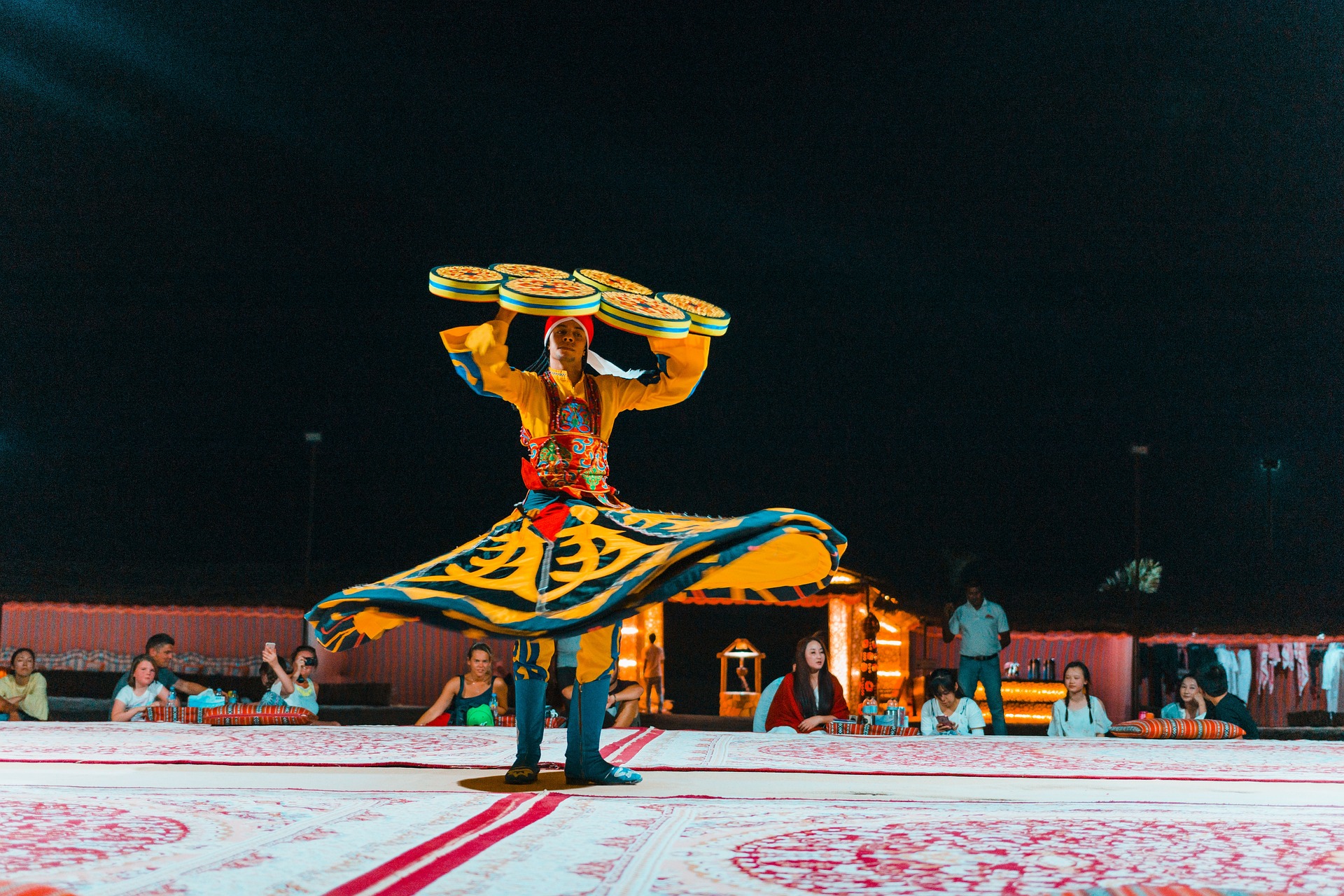
Cultural Adaptation
Cultural adaptation in Dubai is an exhilarating journey that both challenges and rewards those who embrace its diverse blend of traditions, values, and customs. As a global melting pot, the city offers a unique opportunity to immerse oneself in a rich tapestry of cultures, fostering understanding and growth among its inhabitants.
In order to make the most of your time in this vibrant city, it is essential to be open-minded and respectful towards the local customs. One of the most notable aspects of Emirati culture is the importance of modesty. When dressing in public, it is advisable to opt for conservative attire, covering shoulders and knees as a gesture of respect. This practice not only exhibits cultural awareness, but also helps you to blend in with the local community.
Dubai’s culinary landscape is another delightful avenue for cultural adaptation. With an abundance of delectable dishes from around the world, your taste buds will embark on a never-ending gastronomic adventure. Embrace the opportunity to savour traditional Emirati cuisine, such as shawarma, al harees, and al machboos, as you acquaint yourself with the region’s culinary heritage.
Language is another essential aspect of cultural adaptation. While English is widely spoken in Dubai, learning a few basic Arabic phrases will not only ease your day-to-day interactions, but also demonstrate your willingness to engage with the local community. Simple phrases like “As-salāmu ʿalaykum” (peace be upon you) and “shukran” (thank you) can go a long way in fostering connections.
Dubai’s dynamic social scene offers ample opportunities to forge new friendships and acquaintances. Participating in community events, joining social clubs, or engaging in shared hobbies are all effective ways to form lasting connections with fellow expats and locals alike. Embrace the spirit of tolerance and understanding that defines the city, and you will find that cultural adaptation becomes a seamless, enjoyable process.
Cultural adaptation in Dubai is a rewarding experience that enables individuals to grow, learn, and thrive in a diverse environment. By adopting an open-minded approach, respecting local customs, and embracing the city’s rich cultural offerings, you can fully immerse yourself in the enchanting world of Dubai, forging a deep connection with its people and its heritage.
Social Life and Entertainment
Dubai’s social life and entertainment scene are as vibrant and diverse as the city itself, offering a myriad of options for locals and visitors alike. With its eclectic mix of world-class restaurants, trendy bars, and exclusive clubs, there is always something happening in this dazzling metropolis.
For a taste of glamour and sophistication, head to Cavalli Club at the Fairmont Hotel. Fashioned after the Italian designer’s opulent style, the club is renowned for its extravagant interior, delectable cuisine, and high-energy atmosphere. On the other hand, if you prefer a more laid-back experience, indulge in sundowners at the Jetty Lounge, where you can enjoy a picturesque beachfront setting and a relaxed ambience.
Food enthusiasts will be spoilt for choice in Dubai, as the city boasts a plethora of dining options, from chic cafes to Michelin-starred establishments. Be sure to visit La Petite Maison, a French-Mediterranean bistro that has earned a reputation for its exquisite cuisine and stylish decor. Another must-visit is Zuma, a contemporary Japanese restaurant that offers a delightful fusion of traditional flavours and modern presentation.
For those looking for a unique and unforgettable night out, White Dubai is an open-air nightclub situated atop the Meydan Racecourse Grandstand. With its unparalleled views of the city skyline and electrifying atmosphere, White Dubai is a favourite among the city’s elite.
Dubai also caters to theatre and art enthusiasts, with a range of cultural venues such as the Dubai Opera, which hosts world-class performances in ballet, opera, and orchestral music. Alternatively, you can immerse yourself in the local art scene by visiting Alserkal Avenue, an industrial district transformed into a thriving cultural hub.
Lastly, for a family-friendly day out, visit the Global Village, a seasonal extravaganza that combines entertainment, shopping, and culture from around the world. The event features various pavilions, each representing a different country, offering a unique insight into global traditions and customs.
Dubai’s social life and entertainment offerings cater to every taste and preference, from glamorous nightclubs to artistic experiences. Whether you’re a resident or a visitor, the city guarantees an unforgettable experience, providing endless opportunities to create cherished memories.
Legal Matters
Dubai, as part of the United Arab Emirates (UAE), follows a legal system that is primarily based on the principles of Islamic Sharia law, with elements of civil law incorporated into it. The UAE federal legal system governs the emirates, including Dubai, but each emirate also has its own local judiciary.
The Dubai International Financial Centre (DIFC) is a prominent financial hub, boasting its own separate legal and regulatory framework. It is an independent jurisdiction that has its own common-law-based legal system and courts, which cater to civil and commercial disputes, primarily related to finance and business.
Dubai’s judiciary is known for its efficiency and transparency, which has contributed to the emirate’s position as a leading business hub in the region. The legal processes in Dubai are streamlined, and there is a concerted effort to ensure fairness and justice for all parties involved. The government of Dubai continuously works to improve the legal infrastructure, in order to maintain a stable and attractive environment for foreign investors and businesses.
Intellectual property rights are also given importance in Dubai, with the authorities actively working to protect trademarks, copyrights, and patents. This commitment to upholding intellectual property rights demonstrates the emirate’s dedication to fostering innovation and creativity.
In the realm of labour law, Dubai offers a comprehensive set of regulations to protect the rights of both employers and employees. The UAE Labour Law governs matters such as working hours, minimum wages, employee benefits, and dispute resolution, ensuring a well-regulated and harmonious work environment.
Furthermore, Dubai has stringent laws in place to combat financial crimes, such as money laundering and fraud. The authorities work tirelessly to preserve the emirate’s reputation as a secure and reliable financial centre, through the implementation of robust anti-money laundering regulations and the monitoring of financial transactions.
Overall, Dubai’s legal system is marked by its adaptability and commitment to fairness, transparency, and security. By continuously refining its legal infrastructure, the emirate has established itself as a preferred destination for businesses, investors, and individuals from around the globe.
Safety and Security
Dubai stands as a shining example of safety and security in comparison to many other global cities. The city’s authorities have consistently prioritised the well-being of residents and visitors alike, investing heavily in advanced security measures and law enforcement. As a result, Dubai boasts an exceptionally low crime rate, making it an ideal destination for families, tourists, and expatriates.
One key aspect contributing to Dubai’s high safety standards is its well-trained and disciplined police force. The Dubai Police are known for their professionalism and efficiency, working tirelessly to maintain order and prevent criminal activity. Their use of state-of-the-art technology, including surveillance systems and smart patrol vehicles, ensures that the city remains under vigilant watch, and crimes are often swiftly resolved.
Furthermore, the stringent laws in place in Dubai serve as an effective deterrent against criminal activities. Strict penalties for offences such as theft, assault, and drug possession encourage residents to abide by the law, fostering a culture of respect and adherence to regulations. This results in a low incidence of crime, which in turn contributes to the city’s overall sense of security.
In addition to physical safety, Dubai also places a strong emphasis on cyber security. With the growing reliance on digital technology, the city’s authorities have taken proactive measures to safeguard the online space. This includes implementing rigorous data protection policies and providing public awareness campaigns to educate residents about potential cyber threats.
Dubai’s commitment to safety and security extends beyond its own borders, as the city actively collaborates with international partners in combating global threats. This cooperative approach has not only helped to maintain Dubai’s stellar safety record but has also positioned the city as a trusted partner in the global fight against crime.
The exceptional safety standards in Dubai can be attributed to the city’s forward-thinking authorities, well-equipped law enforcement, and stringent legal framework. These elements combine to create a secure environment that distinguishes Dubai as one of the safest cities in the world, setting a benchmark for other urban centres to emulate.
Networking and Community
Networking and community play a vital role in the thriving metropolis of Dubai, fostering connections between individuals from diverse backgrounds and cultures. As a global business hub, Dubai attracts professionals and entrepreneurs from all around the world, creating a melting pot of ideas and experiences that contribute to its dynamic atmosphere.
Business networking events are abundant in the city, providing ample opportunities for professionals to meet, exchange ideas, and form partnerships. From industry-specific conferences and workshops to more casual gatherings, these events allow attendees to expand their professional networks and tap into the wealth of knowledge available within Dubai’s business community.
Moreover, Dubai’s social scene offers a multitude of clubs, associations, and groups catering to a wide range of interests. These organisations create a sense of camaraderie among their members, as well as promote cultural exchange and mutual understanding. Expatriate communities often organise events to celebrate their national holidays or traditions, further enriching the cultural landscape of the city.
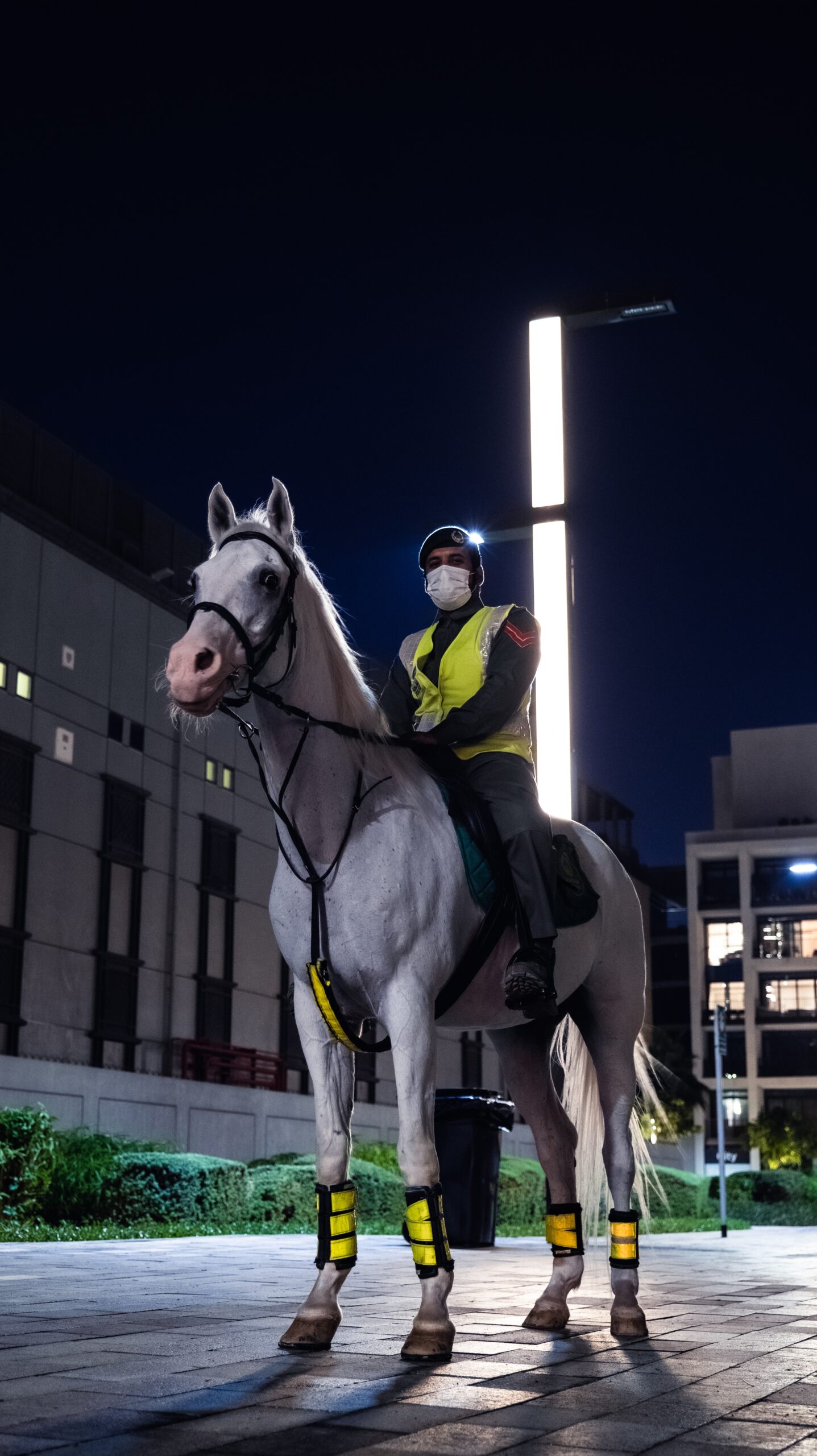
In addition to social and professional networks, community initiatives and charitable organisations are abundant in Dubai. These groups work tirelessly to support various causes, ranging from environmental conservation to providing aid to the underprivileged. By participating in these initiatives, residents can give back to the community and establish meaningful connections with like-minded individuals.
Digital platforms have also played a significant role in fostering networking and community-building in Dubai. Social media groups and online forums have emerged as popular mediums for residents to share information, seek advice, and forge friendships.
Networking and community engagement are integral to the vibrant and diverse fabric of Dubai. By nurturing connections and promoting cultural understanding, Dubai’s residents can enjoy a sense of belonging and contribute to the city’s continued growth and prosperity.
Language
In Dubai, a cosmopolitan metropolis, language plays a vital role in connecting people from diverse backgrounds. The official language, Arabic, is deeply rooted in Emirati culture and heritage. It serves as the primary medium of communication in government and educational institutions. Modern Standard Arabic is commonly used in formal settings, while Emirati Arabic, a regional dialect, is spoken in everyday conversations among locals.
However, due to the city’s booming expatriate population, English has become the de facto lingua franca, enabling seamless interaction between various nationalities. It is widely spoken in businesses, hospitality, and tourism sectors, making Dubai an accessible destination for international visitors. In addition to English, several other languages are spoken in the city, including Urdu, Hindi, Tagalog, Bengali, and Russian, reflecting the rich tapestry of Dubai’s multicultural society.
Given this linguistic diversity, Dubai has evolved into a hub for language learning and cultural exchange. The city boasts numerous language schools and institutions, where individuals can learn Arabic, English, and other languages to enhance their communication skills and cultural understanding. These centres not only facilitate language acquisition but also promote tolerance and appreciation for the myriad cultures that coexist in Dubai.
The prevalence of English and other languages, however, has raised concerns about the preservation of Emirati Arabic and local culture. In response, the UAE government has initiated efforts to encourage the learning and use of Arabic, both within the education system and in everyday life. This includes the implementation of the ‘Arabic Language Charter,’ aimed at promoting the use of Arabic in various sectors and preserving its rich heritage.
The language in Dubai reflects the city’s status as a global melting pot, where diverse cultures and linguistic traditions intermingle. While English serves as the bridge for cross-cultural communication, Arabic remains the cornerstone of Emirati identity, with ongoing efforts to ensure its preservation and promotion.
Climate and Weather
Dubai’s climate is characterised by year-round sunshine, blue skies, and a warm, inviting atmosphere. This emirate experiences a subtropical arid climate, with an average of 3,500 hours of sunshine annually, making it an ideal destination for sun-seekers and outdoor enthusiasts.
During the winter months, from November to March, daytime temperatures range from 24°C to 29°C, offering a pleasant respite from the scorching summer heat. These cooler months are perfect for exploring the city’s countless attractions, with evenings presenting a comfortable 14°C to 18°C. Minimal rainfall, averaging just 100 millimetres per year, ensures clear, beautiful skies throughout the season.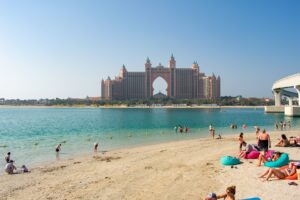
From April to October, Dubai’s summer season takes over, bringing with it soaring temperatures that can reach up to 41°C during the day. The average temperature during this period is 36°C, providing ample opportunities to enjoy the sun’s warmth. Despite the intense heat, Dubai’s world-class facilities and infrastructure are well-equipped to keep residents and visitors cool and comfortable, offering air-conditioned shopping malls, indoor entertainment, and refreshing swimming pools.
High humidity levels, particularly during the months of July and August, can make the heat feel more intense. However, Dubai’s extensive coastline and pristine beaches provide a refreshing escape, with the Arabian Gulf’s inviting waters maintaining an average temperature of 23°C throughout the year.
Dubai’s climate offers abundant sunshine and warm temperatures, making it a desirable destination for those in search of a sun-soaked holiday or a vibrant, year-round outdoor lifestyle. The emirate’s modern infrastructure ensures that both residents and visitors can enjoy all that the city has to offer, regardless of the season.
Help in The Home
In Dubai, having help in the home is not only a luxury but also a practical solution for busy families and professionals. Home help services are widely available, ranging from part-time assistance to live-in maids, ensuring that every household’s needs are met with exceptional care and attention.
Live-in maids are a popular option for many households in Dubai. They provide a full range of domestic services such as cleaning, cooking, and childcare, ensuring that your home runs smoothly and efficiently. These dedicated professionals offer a personalised touch, often forming strong bonds with the families they serve. Live-in maids typically earn between AED 2,000 and AED 3,500 per month, depending on their experience and expertise.
For those who prefer part-time help, there is a vast selection of agencies offering bespoke services tailored to your specific needs. These agencies can provide assistance with housekeeping, laundry, ironing, and even pet care. The cost for part-time home help ranges from AED 30 to AED 50 per hour, providing an affordable solution for those with less demanding domestic requirements.
One of the key advantages of hiring home help in Dubai is the ease with which these services can be arranged. Many reputable agencies are just a phone call or online booking away, offering flexibility and convenience to suit your busy lifestyle. This ensures that you can maintain a spotless home and enjoy more leisure time with your loved ones.
Moreover, home help services in Dubai adhere to high standards of professionalism and training, guaranteeing that your home is in safe and capable hands. Many agencies require their employees to undergo rigorous background checks and thorough training programmes, ensuring that they possess the skills necessary to provide top-notch service.
Investing in home help is not only a smart choice for maintaining a well-kept household, but it also contributes positively to the local economy. By providing employment opportunities for skilled workers, the home help industry plays a crucial role in supporting Dubai’s thriving expatriate community.
The availability of high-quality home help services in Dubai makes it easier than ever to maintain a clean, well-organised household. Whether you opt for a live-in maid or part-time assistance, you can enjoy the benefits of a professionally managed home and more time for what truly matters: spending quality time with family and friends.
Travel Opportunities
Dubai’s strategic location offers a unique opportunity for travellers to explore diverse destinations across continents. Situated at the crossroads of Europe, Asia, and Africa, Dubai serves as an exceptional gateway to myriad cultures, landscapes, and experiences.
One of the many advantages of travelling from Dubai is the ease of access to various regions. With an impressive array of direct flights, visitors can reach the ancient lands of Egypt, the exotic charm of India, or the tropical paradise of the Maldives within just a few hours. Similarly, the Middle East’s captivating destinations like Oman, Jordan, and Lebanon are conveniently reachable, providing a delightful opportunity to witness the region’s rich history, stunning natural wonders, and delectable cuisine.
Europe’s allure lies within close proximity as well, with Dubai’s excellent connectivity ensuring a seamless journey to major European cities such as London, Paris, and Rome. Travellers can immerse themselves in the continent’s artistic heritage, architectural marvels, and vibrant street life while relishing its diverse culinary traditions.
Dubai’s location also presents a chance to venture further east to explore Asia’s enchanting destinations. From the neon-lit streets of Tokyo to the serene temples of Bali, or the vibrant colours of Bangkok’s markets, the unparalleled beauty of Asia’s multifaceted cultures is just a flight away. Australia and New Zealand, too, become more accessible due to Dubai’s connectivity, allowing travellers to experience the breathtaking landscapes, unique wildlife, and laid-back lifestyle of these distant lands.
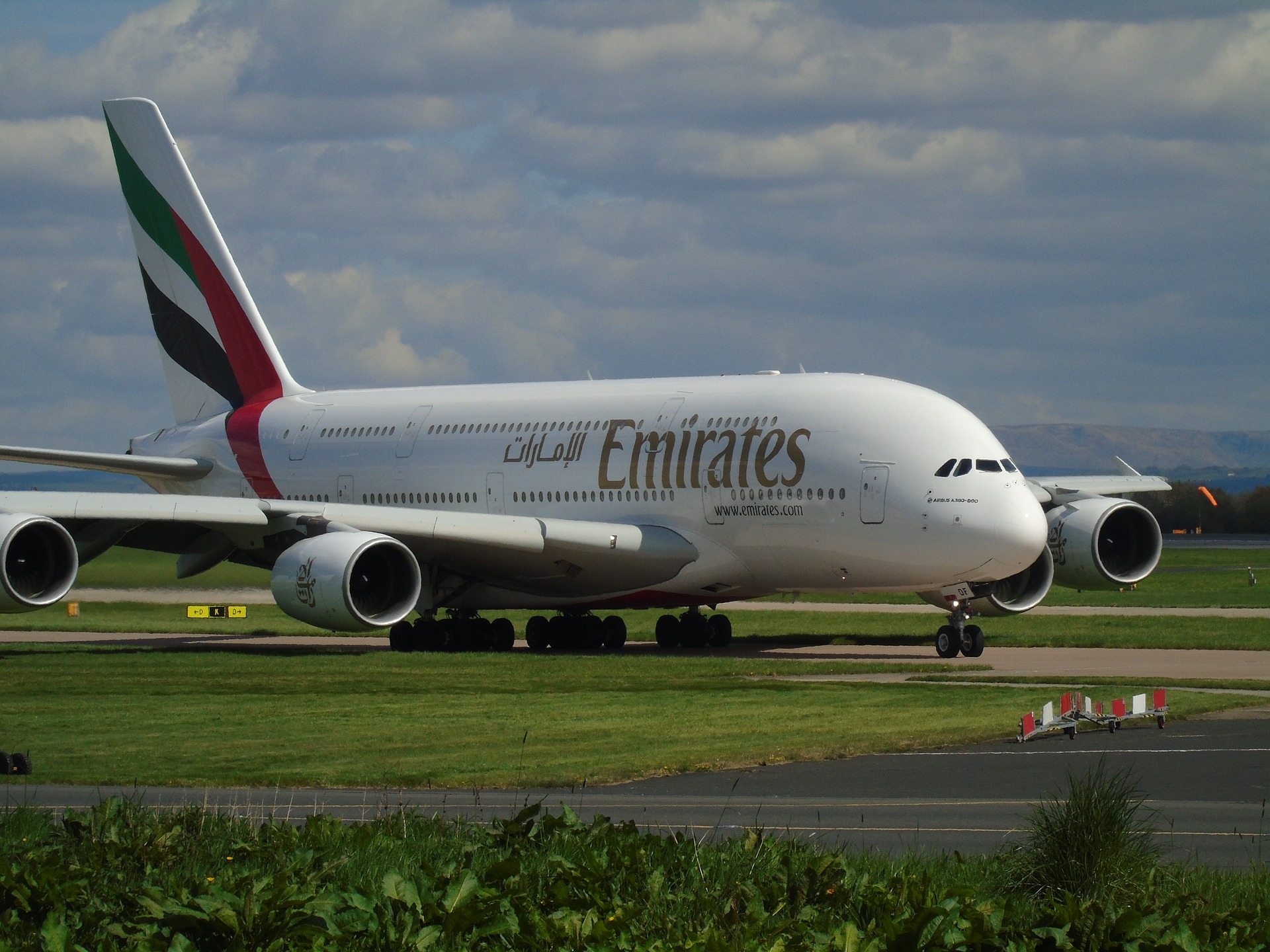
Furthermore, Africa’s captivating natural splendour and cultural richness are within reach for those embarking on their journey from Dubai. Be it a thrilling safari in Kenya, a historical odyssey in Ethiopia, or an adventure through South Africa’s lush winelands, the African continent offers a treasure trove of unforgettable experiences.
Dubai’s strategic location presents a remarkable opportunity for travellers to embark on extraordinary journeys across the globe. Its outstanding connectivity and centralised position make it an ideal springboard to explore the wonders of Europe, Asia, Africa, and beyond, unlocking a world of diverse experiences and memories to cherish.
Volunteering and Charitable Activities
Dubai is a hub for volunteering and charitable activities, with a strong culture of giving and community support. The city’s numerous non-profit organisations and charities provide ample opportunities for individuals to make a positive impact on the lives of others. From supporting education and healthcare initiatives to promoting environmental conservation and animal welfare, there is no shortage of causes to get involved with in Dubai.
The Dubai government has implemented strict rules and regulations around charity work, ensuring that all philanthropic activities are well-organised and transparent. These guidelines are a testament to the city’s commitment to social responsibility and help protect legitimate charities by ensuring that donations reach those who need them most. Moreover, the rules encourage a more professional approach to charity work, fostering trust and confidence among volunteers and donors alike.
One notable organisation promoting volunteerism is the Dubai Volunteering Centre, which connects volunteers with relevant opportunities across various sectors. This government-run initiative has helped thousands of people find meaningful ways to give back, making it easier for individuals to contribute their skills and time to causes that resonate with them.
Another way to get involved is by participating in charitable events held throughout the year. The annual Terry Fox Run, for instance, raises funds for cancer research, while the Standard Chartered Dubai Marathon supports numerous local and international charities. Such events not only generate much-needed funds but also raise awareness and foster a sense of camaraderie among participants.
Dubai Cares, a local philanthropic organisation, focuses on improving access to quality education in developing countries. This homegrown initiative has garnered international acclaim for its impactful projects and commitment to empowering future generations through education.
Additionally, environmental conservation efforts are gaining traction in the city, with organisations like Emirates Environmental Group advocating for sustainable practices and encouraging citizens to take part in initiatives such as clean-up drives, tree planting, and recycling campaigns.
Animal welfare is another area where volunteers can make a difference. Organisations such as K9 Friends and Feline Friends provide shelter, medical care, and adoption services for stray animals while relying on the support of dedicated volunteers.
Dubai’s thriving volunteer and charity sector, backed by well-structured rules and regulations, demonstrates the city’s dedication to fostering a compassionate and responsible society. By engaging in these meaningful activities, individuals can play their part in creating a positive impact on both local and global communities.
Family Life
Family life in Dubai is deeply valued and celebrated, with the traditional family unit at the heart of social life in the city. From community events and cultural festivals to educational programs and recreational activities, there are countless opportunities for families to come together and build lasting memories in this vibrant city.
One of the most notable aspects of family life in Dubai is the emphasis on outdoor activities and healthy living. The city boasts an abundance of parks, beaches, and nature reserves, providing families with ample opportunities to enjoy the great outdoors and stay active. Whether it’s a family picnic in one of the city’s lush green spaces or a day spent exploring the desert dunes, there’s something for everyone in Dubai.
In addition to outdoor pursuits, Dubai is also home to a wide range of family-friendly attractions and events. From theme parks and water parks to museums and galleries, there are countless ways for families to learn, play, and have fun together. The Dubai Aquarium and Underwater Zoo, for example, offers a unique and educational experience for all ages, while the Dubai Miracle Garden is a colorful and captivating destination that is sure to delight visitors of all ages.
Another important aspect of family life in Dubai is the city’s commitment to education and development. The government has invested heavily in the education sector, with a focus on providing world-class facilities and programs for students of all ages. There are a number of prestigious international schools in Dubai, as well as a growing number of universities and vocational training centers.
Overall, family life in Dubai is characterized by a strong sense of community, a commitment to healthy living and education, and an abundance of opportunities for families to come together and create lasting memories. Whether you’re a local resident or a visitor to the city, there’s no shortage of things to see, do, and enjoy with your loved ones in this dynamic and welcoming destination.
Pets and Animal Welfare
Pets and animal welfare are taken seriously in Dubai, and locals have a deep love and respect for their furry companions. From the bustling city streets to the tranquil suburbs, pets can be seen accompanying their owners everywhere. Dogs, cats, birds, and even exotic pets such as hedgehogs and snakes are popular among pet owners in Dubai.
The city offers many pet-friendly parks, beaches, and cafes where pets can roam freely with their owners. Many residential areas also have designated pet areas and facilities, such as dog parks and pet grooming salons, to cater to the needs of pet owners.
The Dubai Municipality has also taken steps to promote animal welfare by implementing strict laws and regulations to ensure the proper treatment of animals. Animal cruelty is a punishable offense in Dubai, and strict penalties are imposed on those who are found guilty of mistreating animals. The Dubai Municipality has also established a veterinary clinic and animal shelter to provide medical care and shelter to abandoned and stray animals.
Local animal welfare organizations also play a significant role in promoting pet care and adoption. These organizations work tirelessly to rescue, rehabilitate, and rehome animals in need. They also organise adoption drives and awareness campaigns to educate the public about responsible pet ownership and the importance of animal welfare.
Pets and animal welfare are highly valued in Dubai, and the city offers a range of pet-friendly facilities and activities for pet owners. The local community’s love and respect for animals are reflected in the strict laws and regulations implemented by the Dubai Municipality and the tireless efforts of animal welfare organizations to promote responsible pet ownership and animal welfare.
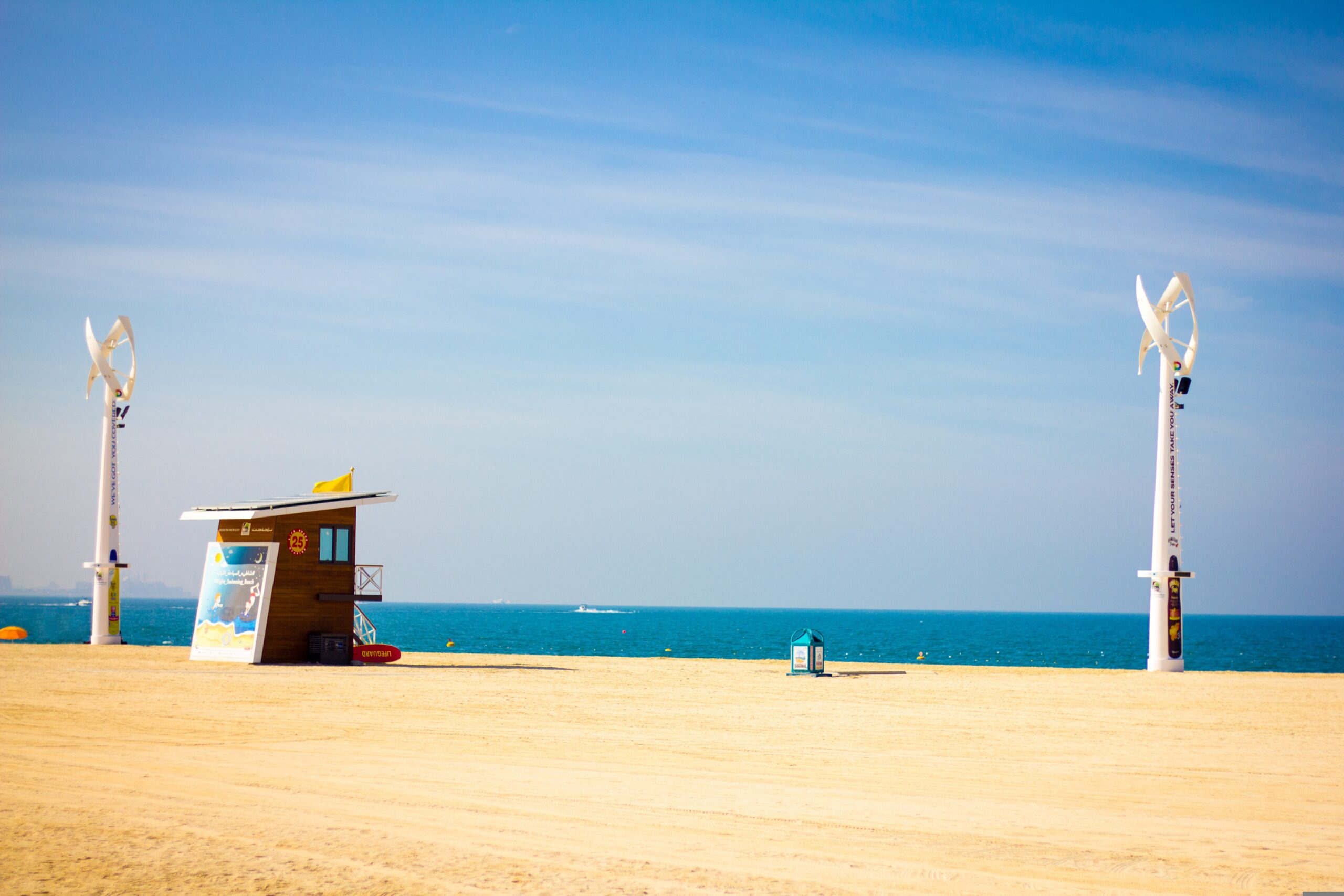
Sustainability and Environment
Sustainability and environmentalism are becoming increasingly important issues in Dubai. The city’s rapid growth and development have placed a significant strain on its natural resources, and the government has been taking steps to mitigate the environmental impact of urbanization. Through a series of initiatives and programs, Dubai is striving to become a more sustainable and eco-friendly city.
One of the key ways in which Dubai is working towards sustainability is through the implementation of green building practices. The city has adopted a comprehensive set of guidelines for sustainable construction, which aim to minimize the environmental impact of new developments. This includes requirements for energy-efficient building design, the use of eco-friendly materials, and the incorporation of renewable energy sources such as solar power. Many new buildings in Dubai are now LEED certified, indicating that they meet rigorous standards for sustainability.
Another area where Dubai is focusing on sustainability is in the management of its waste. The city produces a significant amount of waste each day, and the government has been implementing measures to reduce landfill use and promote recycling. Dubai has set ambitious targets for waste reduction, aiming to divert the vast majority of its waste away from landfills. To achieve this, the city has introduced recycling programs and is encouraging businesses and individuals to adopt more sustainable waste management practices.
In addition to these efforts, Dubai is also making strides in promoting sustainable transportation. The city has invested heavily in public transportation infrastructure, with an extensive network of buses, trams, and metro lines. This has helped to reduce the number of cars on the roads, easing congestion and improving air quality. Dubai is also working towards the adoption of electric and hybrid vehicles, with the aim of reducing emissions and promoting sustainable mobility.
Dubai is also taking steps to protect its natural resources and biodiversity. The city has several protected areas, including the Dubai Desert Conservation Reserve, which is home to a diverse range of wildlife and plant species. Dubai is working to preserve these areas and promote sustainable tourism practices, such as eco-tourism and responsible wildlife viewing.
Finally, Dubai is committed to promoting environmental awareness and education. The city has launched several campaigns to encourage residents and visitors to adopt more sustainable practices, such as reducing energy consumption and using eco-friendly products. Dubai also hosts several events and initiatives each year to promote sustainability and environmentalism, such as Earth Hour and the Dubai Sustainable Tourism Awards.
Dubai is making significant strides towards sustainability and environmentalism. Through a series of initiatives and programs, the city is working to reduce its environmental impact and promote eco-friendly practices. From green building design to waste management and sustainable transportation, Dubai is taking a comprehensive approach to sustainability that will help to ensure a better future for generations to come.
Local News and Current Events
Dubai boasts a vibrant media landscape, with several local news and current outlets catering to the diverse population. These media entities play a pivotal role in ensuring the public stays informed and up-to-date with the latest happenings in the city and the wider UAE.
One of the most reputable news outlets in Dubai is Gulf News, a daily English-language newspaper that covers a wide range of topics, including local and international news, business, politics, and sports. Established in 1978, Gulf News is considered a leading voice in the region, providing in-depth analysis and well-researched stories.
Another prominent news outlet is Khaleej Times, an English-language daily that was established in 1978. Offering comprehensive coverage of local and international events, Khaleej Times is a trusted source for news and current affairs. The newspaper also features insightful opinion pieces, lifestyle articles, and entertainment news.
The National is yet another esteemed news platform in Dubai, providing readers with extensive coverage of local, regional, and international news. Launched in 2008, this English-language daily newspaper offers high-quality journalism and is known for its well-rounded coverage of various topics, including culture, sports, and technology.
For business enthusiasts, Arabian Business is a leading publication that offers comprehensive coverage of the regional business landscape. The magazine is published weekly and is available online, providing insightful analysis and data on the business and finance sectors in Dubai and the Middle East.
In addition to print and online newspapers, Dubai has several radio stations and television channels catering to diverse audiences. Dubai Eye 103.8 is a popular English-language talk radio station that broadcasts news, current affairs, and lifestyle content. Meanwhile, City 101.6 is a popular radio station catering to Dubai’s large Indian population, offering a mix of news, music, and entertainment.
Dubai Media Incorporated (DMI) is a significant media organisation in the city, operating a range of television channels and radio stations. Notable channels under DMI include Dubai One, which offers a mix of Western entertainment and news programming, and Dubai TV, an Arabic-language channel featuring news, current affairs, and cultural content.
Dubai is home to a dynamic and diverse media landscape, with numerous local news and current outlets catering to the needs of its multicultural population. From established daily newspapers like Gulf News and Khaleej Times to business publications and television channels, residents and visitors alike can stay well-informed about the latest happenings in the city and beyond.
In Summary
This Definitive Expat Guide to Dubai serves as a comprehensive resource for anyone planning to move or work in this bustling city. Dubai has quickly become a global hub for expatriates, offering a unique blend of modernity, luxury, and cultural richness. This guide covers essential aspects of living in Dubai, ensuring a smooth transition for new residents.
Housing and Accommodation in Dubai offer a wide range of options, from high-rise apartments to lavish villas. The city has various neighbourhoods catering to different lifestyles, with communities like Jumeirah, Dubai Marina, and Downtown Dubai among the most popular choices. Renting or purchasing property is relatively straightforward, with numerous estate agencies and online portals available to assist in finding the perfect home.
Work and Business opportunities in Dubai are abundant, with the city being a leading destination for professionals seeking to advance their careers. The city’s business landscape includes sectors such as finance, technology, tourism, and trade. Networking and establishing connections are crucial for securing job opportunities and growing one’s professional network.
The Cost of Living in Dubai can be higher than in other cities, especially regarding housing and education. However, salaries are often competitive, and there are no personal income taxes, which helps offset the expenses. Shopping for groceries and other essentials can be affordable if one opts for local markets and discount stores.
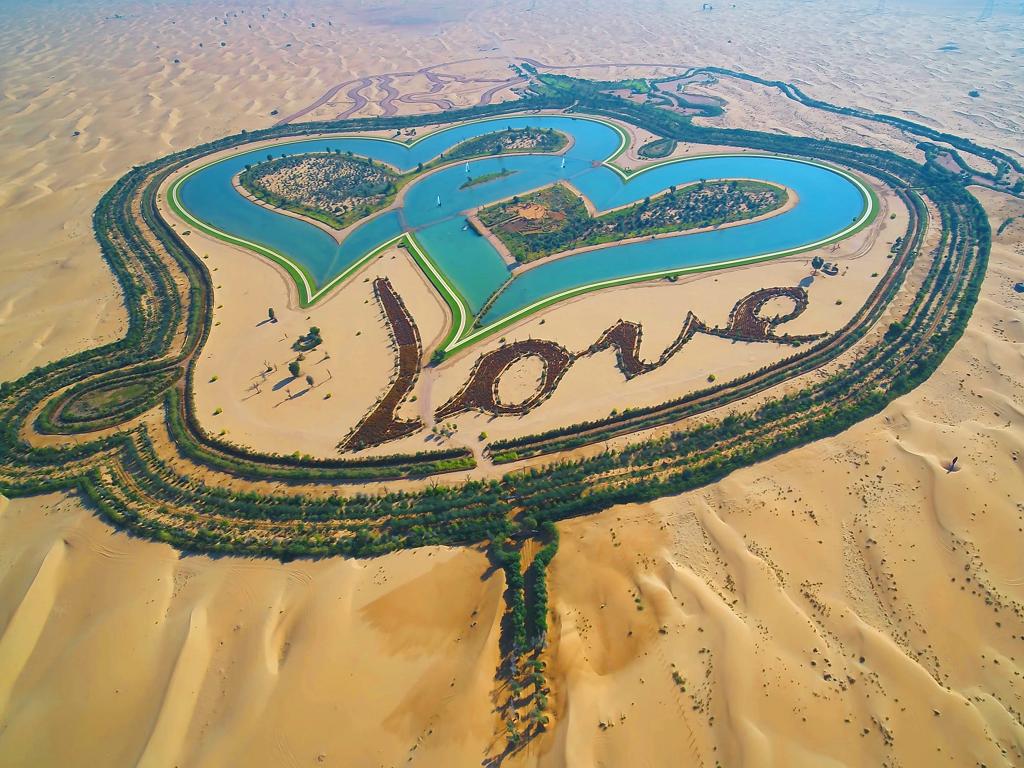
Healthcare in Dubai is of high quality, with world-class hospitals and medical facilities offering comprehensive services. Health insurance is mandatory for residents, and many employers provide coverage as part of their employment packages.
Education in Dubai is diverse, with numerous international schools catering to various curriculums and languages. The city also hosts several esteemed universities and higher education institutions, ensuring that residents have access to quality education at all levels.
Visa and Immigration processes in Dubai are generally straightforward, with various visa types available depending on one’s employment status or nationality. It is essential to research and follow the proper procedures to ensure compliance with the UAE’s immigration laws.
Transportation in Dubai is well-developed, with options like the metro, buses, taxis, and ride-hailing services. Owning a car is also common, and the city’s roads are well-maintained and easy to navigate.
Cultural Adaptation is a vital aspect of living in Dubai, as the city is home to a diverse population. Understanding and respecting local customs, traditions, and laws is essential for a harmonious experience in the emirate.
Social Life and Entertainment in Dubai are abundant, with numerous malls, restaurants, bars, and clubs offering varied options for leisure and relaxation. The city also hosts a plethora of cultural and sporting events throughout the year, catering to a diverse audience.
Legal Matters in Dubai are governed by a mix of Islamic and civil laws. It is crucial for expats to familiarise themselves with the local laws and regulations to avoid any legal issues.
Safety and Security in Dubai are exceptional, with the city consistently ranking as one of the safest in the world. A low crime rate and effective law enforcement contribute to a secure environment for residents.
Networking and Community are essential aspects of expat life in Dubai. Joining social clubs, professional associations, and attending networking events can help newcomers build valuable connections and friendships.
Language in Dubai is primarily Arabic, but English is widely spoken and understood. Learning basic Arabic phrases can be beneficial in daily interactions and for integrating into the local community.
Climate and Weather in Dubai are characterized by hot, sunny days and mild winters. Adapting to the heat and staying hydrated is crucial, especially during the sweltering summer months.
Help in the Home is readily available, with many expats employing domestic help such as maids, nannies, and drivers. It is essential to follow local laws and regulations when hiring and employing household staff.
Dubai’s strategic location makes it a Travel Hub, offering excellent connectivity to various destinations across the globe. With its world-class airport and numerous airlines, residents can easily explore neighbouring countries and beyond.
Volunteering and Charitable Activities in Dubai are encouraged, with several local and international organizations providing opportunities for residents to give back to the community. Participating in such initiatives can be a rewarding way to make a difference and build connections.
Family Life in Dubai is well-supported, with various amenities and facilities catering to families. Numerous parks, beaches, and attractions make the city an enjoyable place to raise children, ensuring a comfortable and fulfilling lifestyle.
Pets and Animal Welfare are essential considerations for expats planning to bring their furry friends to Dubai. The city has several pet-friendly parks and accommodations, as well as veterinary clinics and pet care services. It is crucial to be aware of local laws and regulations governing pet ownership and animal welfare.
Sustainability and Environment initiatives are on the rise in Dubai, with the government and private sector working together to promote eco-friendly practices. From solar energy projects to recycling programs, the city is actively working towards a more sustainable future.
Local News and Current Events are well-covered by Dubai’s diverse media landscape, ensuring residents stay informed about the latest happenings in the city and beyond. Newspapers, television channels, and radio stations cater to various languages and interests, providing comprehensive coverage of local and international news.
In conclusion, the Definitive Expat Guide to Dubai offers a thorough overview of the various aspects of life in this dynamic city. From housing and work opportunities to social life and cultural adaptation, the guide covers essential information for a smooth and enjoyable experience for newcomers. With careful planning and an open mind, expatriates can make the most of their time in this unique and thriving city.
So, what’s stopping you? Enjoy Dubai!
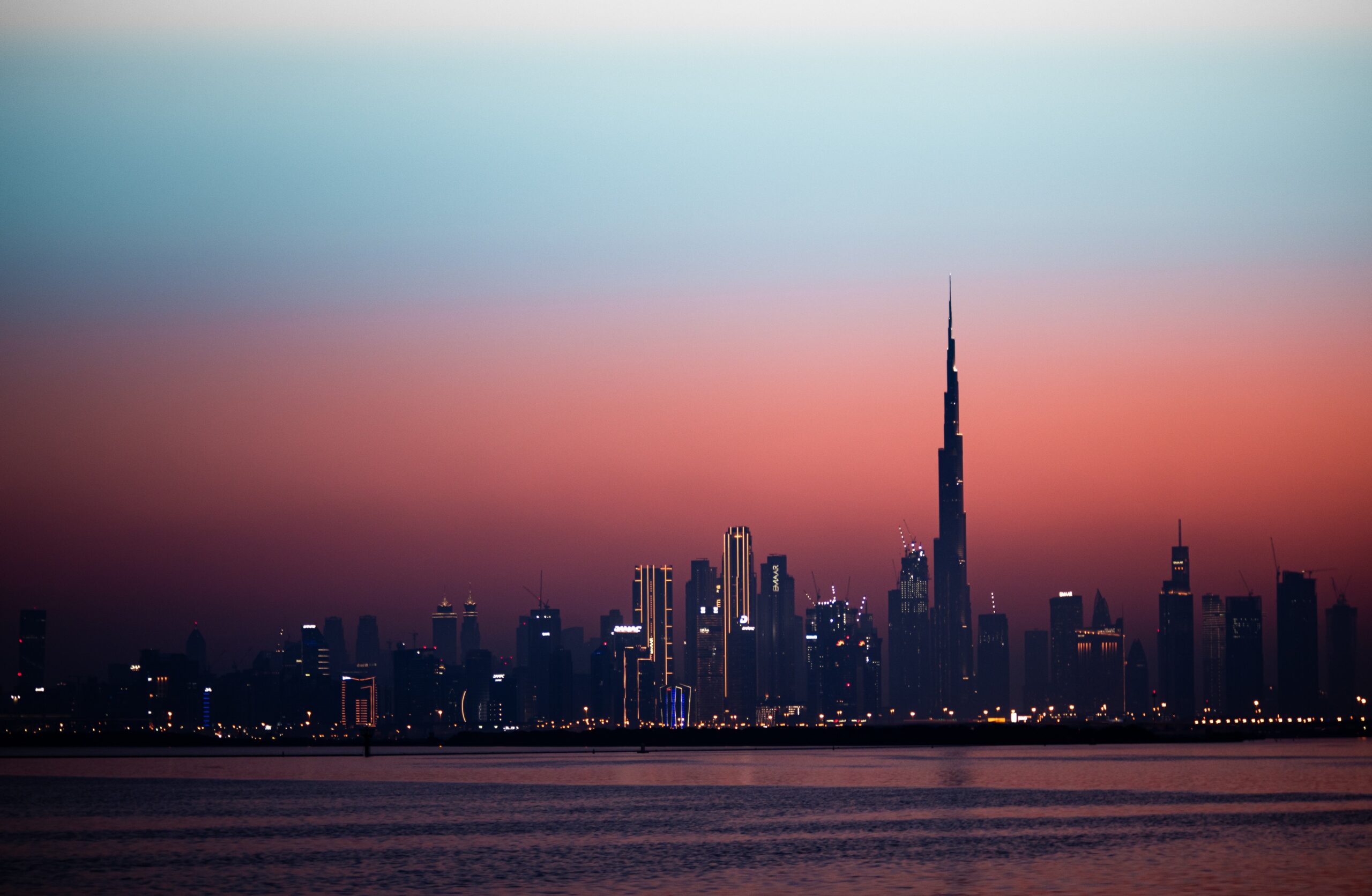
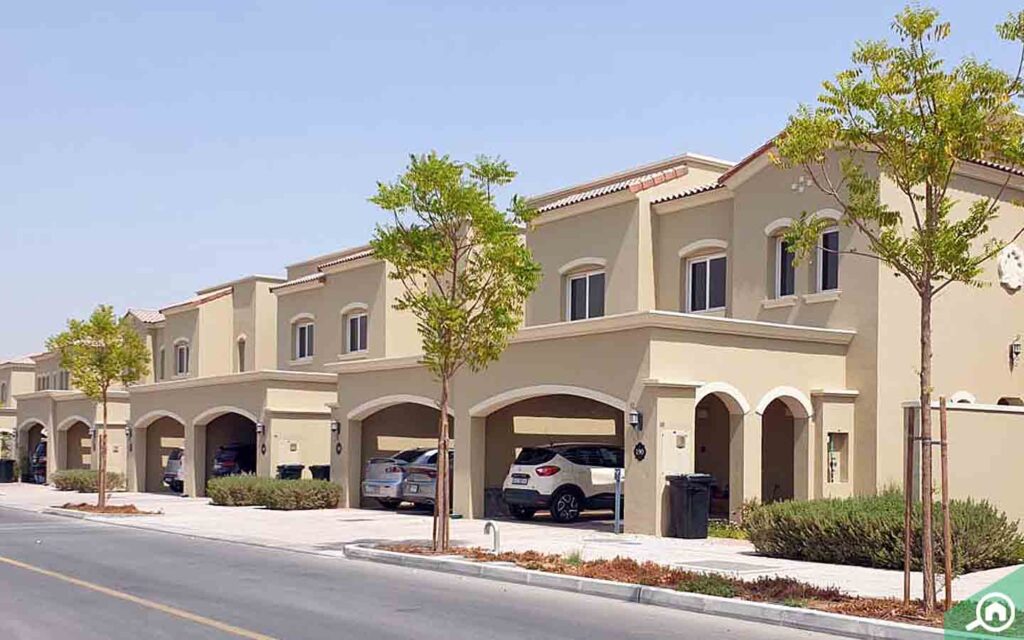
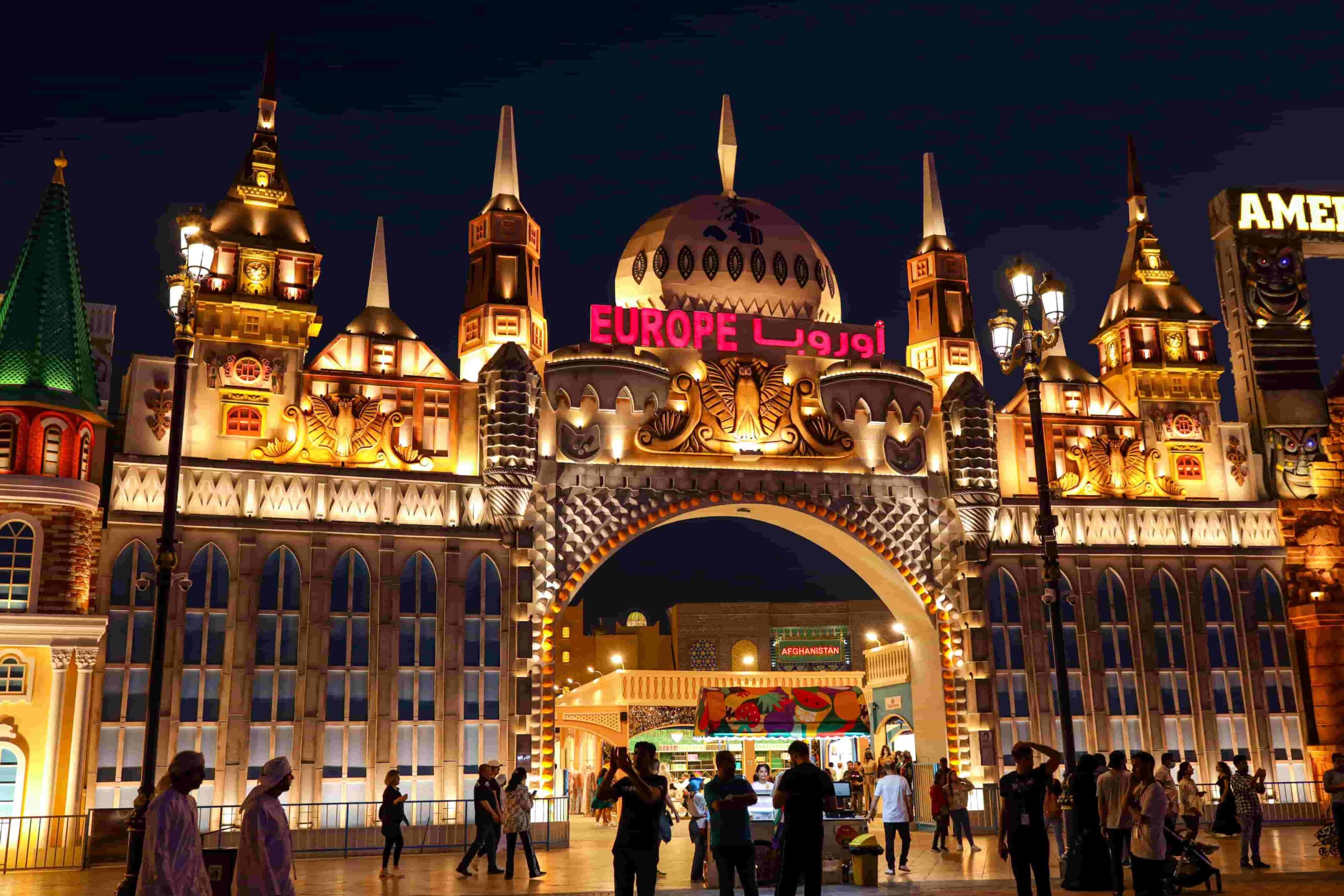
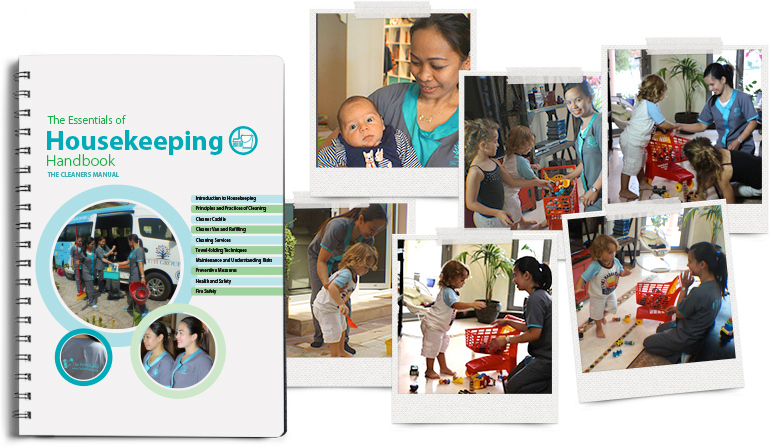
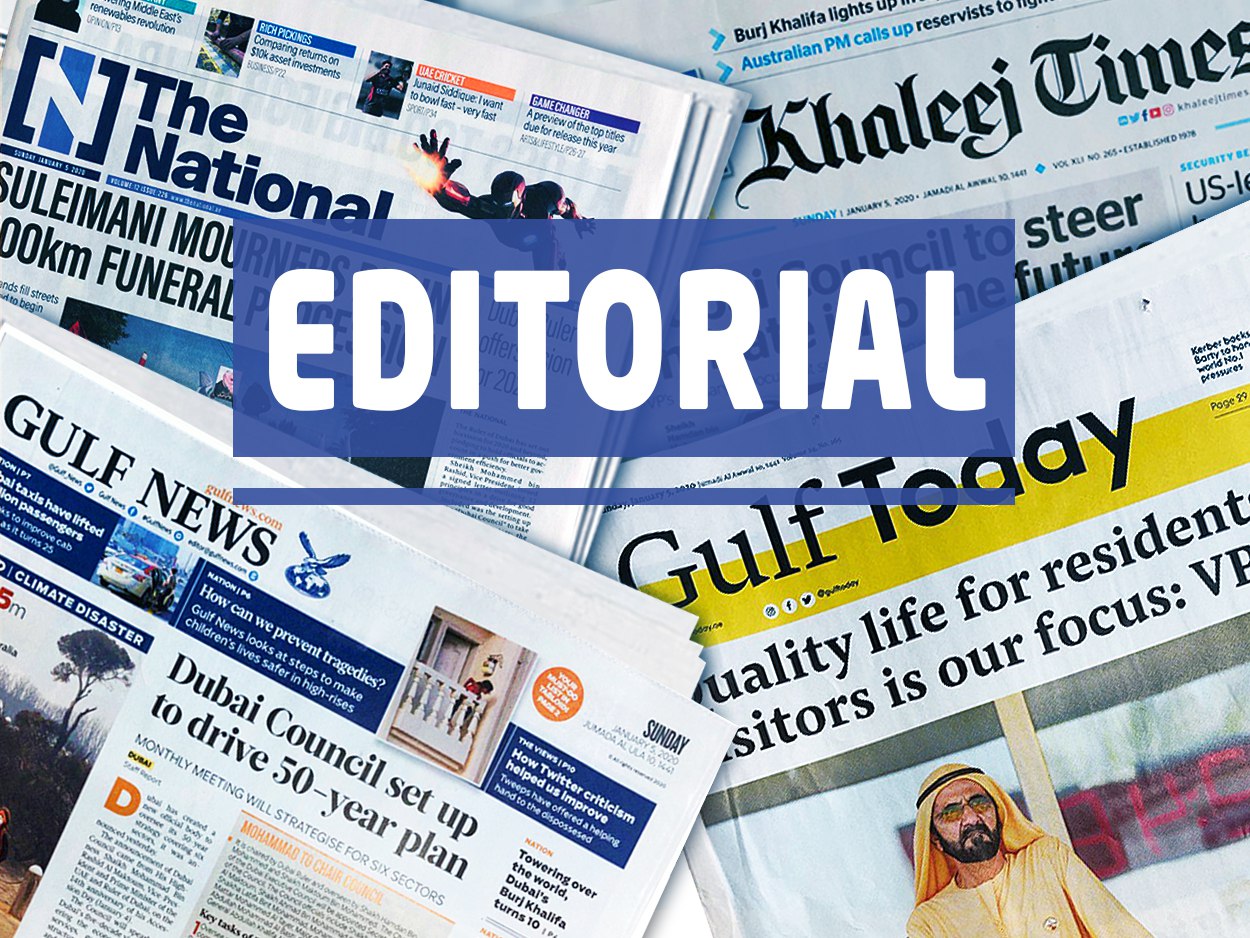
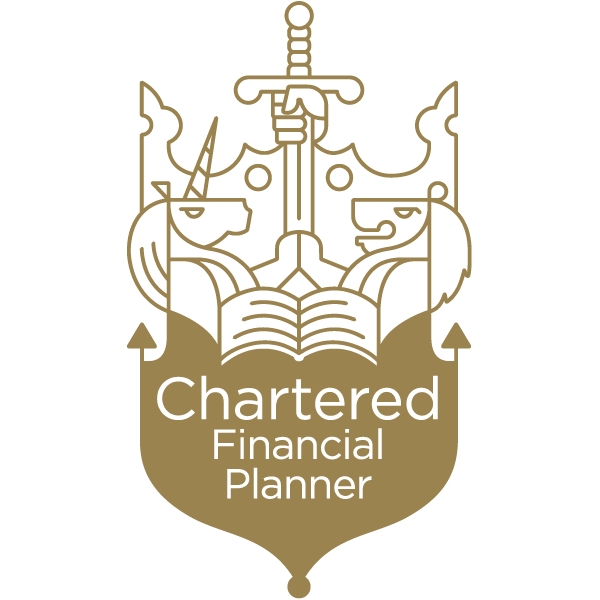
Interesting blog, learned some things I didn’t know about Dubai 🙂
Good write-up. I definitely appreciate this website. Continue the good work!
Dubai, the cosmopolitan city in the United Arab Emirates, is a popular destination for expats seeking job opportunities, a high standard of living, and a vibrant lifestyle.
Before moving to Dubai, research the visa requirements and ensure you have the necessary documentation for your stay. Dubai offers various visa options, including employment visas, investor visas, and residency permits.